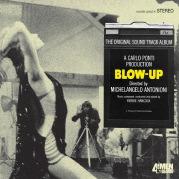Herbie Hancock Meets Austin Powers
This odd scenic detour on Herbie Hancock's career path is well worth visiting 36 years later, both because of the intrinsic value of the music he created for the movie and because it resonates so effectively with the current interest in the "swinging '60s" popularized by (and sent-up in) the Austin Powers flicks--though on a far more cerebral plane than Powers could ever hope to reach. These culturally repressed and repackaged, often dead-ended times make looking back at Blow-Up--the movie--all the more alluring for its promise of excitement, sexual liberation, and a progressive changing of the socio-sexual guard.
Director Michelangelo Antonioni uses the premise of an accidentally filmed murder and the mystery behind it to take a shallow, glinting peek into the glamorous (or pseudo-glamorous) world of fashion as seen through the emotionally numbed eyes of a still photographer (David Hemmings) whose day job is to coax sexuality from skinny, attractive runway babes, and whose night job description was probably the same.
Few of us had seen a fashion photo shoot--real or simulated--so watching Hemmings cajole his girls into giving the camera what it demanded was entertainment enough. Add the slowly unfolding murder plot (exposed through a series of enlargements of a seemingly tranquil landscape photograph), a backdrop of hip parties, hot chicks, snazzy nightclubs, and Hemming's growling "babe-mobile," and you had a space-age bachelor-pad wet dream that made most of the college kids watching it question their chosen career paths.
Dialog and storyline plotting were scarce--it was mainly about Hemmings' awakening to the fact that there might be something intriguing and emotionally involving beyond the edges of his eyelids-- and there were glimpses of nudity and "sexual situations" (not to mention cutaways to tennis playing mimes in full Marcel Marceau mufti), all of which ensured that the movie hardly passed for popular entertainment fare when first released.
The "all style, no substance" film made the rounds in the kinds of art and collegiate circles where nothing is made into something, and the shallow but enjoyable trifle came to symbolize whatever was in the eyes, brains, and crotches of its beholders. On the other hand, let's not downplay the value of high style and high concept, both of which brimmed over in this film.
The director "hand picked" the then-twenty-something Hancock to do the film's score, according to the original liner notes. And--according to the new liner notes by Steve Dollar--Hancock's attempt to record with British musicians failed, so he returned home and called a few friends, including Freddie Hubbard, Joe Henderson, Jack DeJohnette, Jim Hall, and Ron Carter.
That single detail about this unusual set should pique the interest of some of you. At a time when guys like John Scofield and Modeski, Martin & Wood are funking up their jazz, here's Herbie and friends bumpin' 1966 style. The music veers from playful jazz-pop propelled by Hancock on organ and some unusually charged comping from the usually reserved Hall, to straight-ahead "jazz" of both the "cool, slinky" and semi free-form varieties. There's also the added attraction of The Yardbirds' hot take on "Train Kept A Rollin'" (which they call "Stroll On" here, perhaps for royalty-check reasons). The group appears in two scenes in the movie.
Mood and attitude prevail over substance in the music making, but don't knock mood when it comes to the music. This set will put you in a fine one, whether you'll be reliving the time in which this music was made or merely imagining what it must have been like. By the way: the mid-'60s vibe was every bit as cool as this music makes it sound--even if what was on screen was shallow and sometimes silly.
No engineering information is supplied, but the recording has a 1960s-era Rudy Van Gelder feel, with transparently recorded instruments in a hard-left, -right, and -center spread. The natural, unforced quality of the recording and a fine sense of depth makes up for the hard spread, and overall, you'll like the sound.




